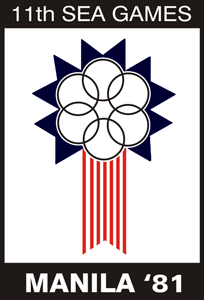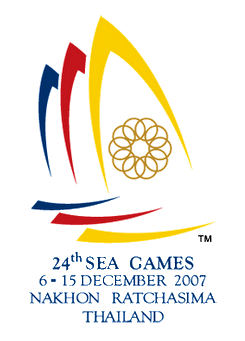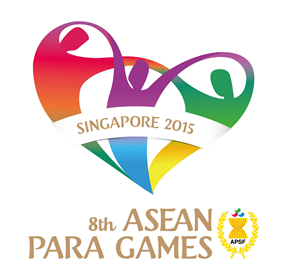
Singapore competed at the 2004 Summer Olympics in Athens, Greece, from 13 to 29 August 2004. This was the nation's thirteenth appearance at the Olympics, except for two different editions. Singapore was part of the Malaysian team at the 1964 Summer Olympics in Tokyo, but did not attend at the 1980 Summer Olympics in Moscow, because of its support for the United States boycott.
The following lists events that happened during 1983 in Singapore.

The 2005 Southeast Asian Games, officially known as the 23rd Southeast Asian Games, was a Southeast Asian multi-sport event held in Manila, Philippines.

The 1981 Southeast Asian Games, officially known as the 11th Southeast Asian Games, was a multi-sport event held in Manila, Philippines from 6 to 15 December 1981. This was the first time that the Philippines hosted the Games since its first participation in 1977, and by that, the Philippines became the sixth nation to host the SEA Games after Thailand, Burma, Malaysia, Singapore and Indonesia.
The 1999 Southeast Asian Games, officially known as the 20th Southeast Asian Games, was a Southeast Asian multi-sport event held in Bandar Seri Begawan, Brunei Darussalam. This was the first time Brunei hosted the Southeast Asian Games and also in Borneo island. These were the last to have ever staged during the 20th century, and this was the only occasion, to date, that Brunei had held the SEA Games.

The 1993 Southeast Asian Games, officially known as the 17th Southeast Asian Games were held in Singapore from 12 to 19 June 1993 with 29 sports in 440 events featured in this edition. This was the third time Singapore hosted the games after 1983 and 1973 competition. It was opened by President Wee Kim Wee. The Games featured 29 sports in 440 events. The final medal tally was led by Indonesia.

The 2003 Southeast Asian Games, officially known as the 22nd Southeast Asian Games, SEA Games 22 and also known as Vietnam 2003, was a Southeast Asian multi-sport event held from 5 to 13 December 2003 in Hanoi, Vietnam. This was the first time that Vietnam had staged the SEA Games, and it saw East Timor, which had just gained independence in 2002; although not being an ASEAN member and despite its geographical location closer to the Pacific archipelago than the Asian continent, making its debut at the games.

The 2007 Southeast Asian Games, officially known as the 24th Southeast Asian Games, was a Southeast Asian multi-sport event held in Nakhon Ratchasima (Korat), Thailand. This was the sixth time Thailand hosted the Southeast Asian Games and its first time since 1995. Previously, Thailand also hosted the 1959 inaugural games, 1967 games, 1975 games and the 1985 games.

The 2009 Southeast Asian Games, officially known as the 25th Southeast Asian Games, was a Southeast Asian multi-sport event hosted by Vientiane, Laos. This was the first time Laos had held the Southeast Asian Games as Laos had previously declined hosting the 1965 Southeast Asian Peninsular Games, citing financial difficulties. This was also the first time the Southeast Asian Games was held in a landlocked country.

The 2013 Southeast Asian Games, officially known as the 27th Southeast Asian Games, or the 27th SEA Games, and commonly known as Naypyitaw 2013, was a Southeast Asian multi-sport event took place in Nay Pyi Taw, Myanmar from 11 to 22 December 2013, Around 4730 athletes from 11 participating nations competed at the games, which featured 460 events in 34 sports. The games were held from 11 to 22 December 2013.

The 2008 ASEAN Para Games, officially known as the 4th ASEAN Para Games, was a Southeast Asian disabled multi-sport event held in Nakhon Ratchasima, Thailand from 20 to 26 January 2008, one month after the 2007 Southeast Asian Games. This was the first time Thailand hosted the ASEAN Para Games.

The 2017 Southeast Asian Games, officially known as the 29th Southeast Asian Games, or the 29th SEA Games, and commonly known as Kuala Lumpur 2017, was a Southeast Asian multi-sport event that took place from 19 to 30 August 2017 in Kuala Lumpur, Malaysia. This was the sixth time that Malaysia hosted the games and its first time since 2001. Previously, it had also hosted the 1965, 1971, 1977 and 1989 editions of the games. The 2017 edition is most notable for being the first edition to include winter sports.

The 2015 Southeast Asian Games, officially known as the 28th Southeast Asian Games, or the 28th SEA Games, and commonly known as Singapore 2015, was a Southeast Asian multi-sport event held by the city-state of Singapore from 5 to 16 June 2015, It was the fourth time the country hosted the games. Singapore previously also hosted the games in 1973, 1983 and 1993 edition.

The 2014 ASEAN Para Games, officially known as the 7th ASEAN Para Games, was a Southeast Asian disabled multi-sport event held in Naypyidaw, Myanmar three weeks after the closing of the 2013 Southeast Asian Games from 14 to 20 January 2014. This was the first time Myanmar hosted the ASEAN Para Games.

The 2019 Southeast Asian Games, officially known as the 30th Southeast Asian Games, or the 30th SEA Games, and commonly known as Philippines 2019, was the 30th edition of the Southeast Asian Games, a biennial regional multi-sport event which was held in the Philippines from 30 November to 11 December 2019. However, due to a narrow calendar, some sports started before the opening ceremony as early as November 24.

The 2015 ASEAN Para Games, officially known as the 8th ASEAN Para Games, and commonly known as Singapore 2015, was a Southeast Asian disabled multi-sport event held from 3 to 9 December 2015 in the city-state of Singapore. Unlike the previous editions the games were held six months after the closing of the 2015 Southeast Asian Games. This was Singapore's first time as host of the ASEAN Para Games.

The 2017 ASEAN Para Games, officially known as the 9th ASEAN Para Games, was a Southeast Asian disabled multi-sport event held in Kuala Lumpur, Malaysia, 17 days after the 2017 Southeast Asian Games from 17 to 23 September 2017. This was the third time Malaysia host the ASEAN Para Games and its first time since 2009. Previously, Malaysia also hosted the inaugural games in 2001.

The 2016 ASEAN University Games, officially known as the 18th ASEAN University Games, was a Southeast Asian university multi-sports event held in Singapore. This was the third time Singapore hosted the ASEAN University Games, and its first time since 1994. Previously, Singapore also hosted the 1986 games.

The closing ceremony of the 2019 Southeast Asian Games took place on the evening of Wednesday 11 December 2019 at the New Clark City Athletics Stadium, in New Clark City, Capas, Tarlac.
The 2017 Southeast Asian Games opening ceremony was held in Bukit Jalil National Stadium on 19 August 2017 at 20:17 MST (UTC+8) which highlighted aspects of Malaysia's history and culture. The ceremony was directed by film director Saw Teong Hin alongside the Memories Entertainment creative team with co-operation from the Malaysian Armed Forces. The time 20:17 was chosen to start the opening ceremony to mark the year 2017, the year which Malaysia hosted the 29th Southeast Asian Games.

















